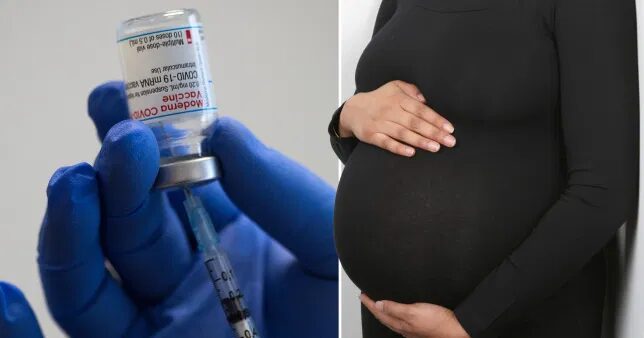
In an update posted on Tuesday to the WHO's official website, the Strategic Advisory Group of Experts (SAGE) said they do not recommend the use of the vaccine in pregnant women.
Only those who are at risk of high exposure to the virus, such as healthcare workers, should consider having the jab.
The guidance on Moderna's candidate read: 'While pregnancy puts women at a higher risk of severe COVID-19, the use of this vaccine in pregnant women is currently not recommended, unless they are at risk of high exposure (e.g. health workers).'
'The vaccine can be offered to a breastfeeding woman who is part of a group recommended for vaccination (e.g. health workers); discontinuing breastfeeding after vaccination is currently not recommended,' it added.
Experts advised the jab should be administered in two doses 28 days apart. But 'if necessary', the interval between the doses may be extended to 42 days.
They added that people with severe allergies to any component of the vaccine should not take Moderna's or any other mRNA jab.
Moderna's jab, which has proven to be 94% effective against the virus, became the third Covid-19 vaccine to be approved in the UK in January.
The UK's medicines watchdog previously confirmed that pregnant and breastfeeding women can take either Pfizer-BioNTech or Oxford-AstraZeneca's jabs 'when the potential benefits outweigh the risks'.
Comment: When the benefits of vaccinating against a mostly benign virus outweigh the risks of losing a pregnancy, or some other vaccine damage? So then, never?
After analysing further data, the Medicines and Healthcare products Regulatory Agency (MHRA) said medics could consider administering the vaccine during pregnancy 'following an individual discussion with every woman'.
The Joint Committee on Vaccination and Immunisation (JCVI) now recommends that Pfizer or AstraZeneca's vaccines should be considered in pregnancy where the risk of exposure to coronavirus is 'high and cannot be avoided', or where the woman has underlying health conditions.
Comment: The same underlying conditions they've been blaming the vaccine associated deaths on? See: At least twenty-three people die in Norway within days of receiving Pfizer coronavirus vaccine
Guidance published in December on Oxford-AstraZeneca's vaccine said preliminary animal studies do not indicate direct or indirect harmful effects for pregnancy, embryo-foetal development, childbirth or postnatal development.
The British government has ordered 17 million doses of Moderna's jab, which the pharmaceutical company yesterday confirmed is effective against mutant variants found in the UK and South Africa.
But as a precaution, Moderna will start developing a vaccine booster shot to see if it improves the immune response from the South African variant.
Doses of supplies are expected to be delivered to the UK by spring.
This is because it is being manufactured in the US and it will take a few months before facilities in Europe will be able to distribute it.



R.C.